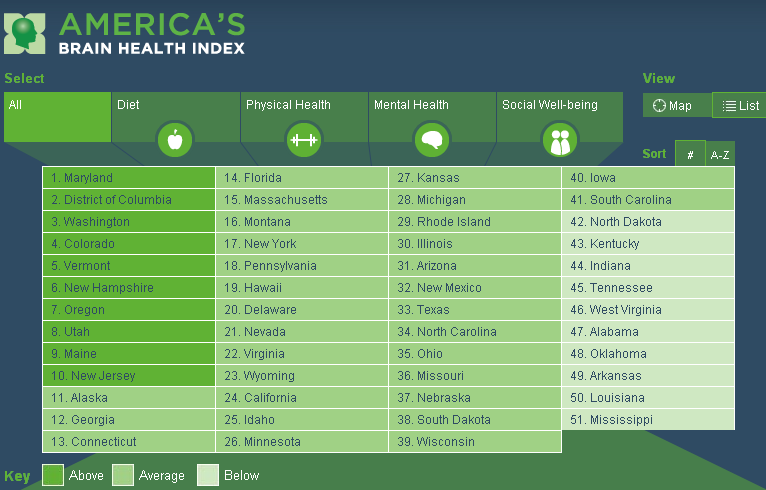Tai Chi Boosts Brain Volume and Performance
 Research led by the University of South Florida found elderly Chinese that practiced Tai Chi three times a week scored significantly higher on thinking and memory tests than a control group. They also demonstrate that the volume or physical size of the subject’s brain increased rather than experiencing age-related shrinkage.
Research led by the University of South Florida found elderly Chinese that practiced Tai Chi three times a week scored significantly higher on thinking and memory tests than a control group. They also demonstrate that the volume or physical size of the subject’s brain increased rather than experiencing age-related shrinkage.
This is an interesting finding because it suggests a non-areobic form of exercise can improve brain function.
Tai Chi is a type of martial arts. It includes five training elements the most widely known being the slow solo hand movements. The training emphasizes focusing your mind exclusively on the motion being practiced. This produces a meditative-like calm which might account for the brain boosting effects.
For more details on the brain health benefits and a video introduction check out the Next Brain Blog post on Tai Chi for Cognitive Training.
Source of Image: China on the brink
Categories: Ancient Ways, Lifestyle, Memory and Learning, Older Adult Tags:
Perception of Age Impacts Cognitive Performance
 Your personal sense of age can have a dramatic (and measurable) impact on your cognitive performance. At least that is the result of recent research at the University of Exeter on a group of 60-70 year olds. Members of the group were primed to feel either older or younger, read two articles on the impact of age on cognition and then given a battery of clinical tests related to mental functioning including a dementia test. They found participants that viewed themselves as older were five times more likely to receive a dementia diagnosis. To quote:
Your personal sense of age can have a dramatic (and measurable) impact on your cognitive performance. At least that is the result of recent research at the University of Exeter on a group of 60-70 year olds. Members of the group were primed to feel either older or younger, read two articles on the impact of age on cognition and then given a battery of clinical tests related to mental functioning including a dementia test. They found participants that viewed themselves as older were five times more likely to receive a dementia diagnosis. To quote:
“Our research shows that the effect of age perceptions on performance can be dramatic, and that seeing oneself as ‘older’ significantly increases a person’s risk of being diagnosed with dementia on such tests.”
A strong result suggesting that our assumptions about age and how that impacts brain function can dramatically shape cognitive performance.
Categories: Cognitive Decline, Memory and Learning, Older Adult Tags:
Exercise Once Weekly Helps Avoid Mental Decline
While the Next Brain Blog is dedicated to techniques that improve brain function and enhance cognitive performance, I get a lot of email asking about ways to protect or maintain existing brain health. Fortunately, many techniques work both ways. They will boost your brain power or simply protect what you have depending on your age and the intensity of implementation.
 Take for example a recent study led by the Mayo Clinic that looked at the role of exercise and computer use in avoiding mild cognitive impairment in older adults. A key finding:
Take for example a recent study led by the Mayo Clinic that looked at the role of exercise and computer use in avoiding mild cognitive impairment in older adults. A key finding:
“Even exercising once a week was beneficial. Most of the participants seeing the greatest benefits were exercising five to six times a week combined with computer activity,” says Geda.
The benefit in this case is avoiding age-related memory loss.
On the other hand, walking and exercise has been found to improve cognitive performance not just avoid memory loss. In one example participants had to walk at least 3 times a week for 40 minutes.
Perhaps the habits we develop to boost our intelligence will also be the habits that we need to maintain brain health as we age.
Categories: Cognitive Decline, Lifestyle, Older Adult Tags: exercise
Gift Giving Idea: Consider Fat Brain Toys
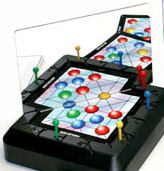 Fat Brain offers an amazing collection of high quality toys and entertainments designed to stimulate the brain and develop cognition. You can shop for toys by gender and ages ranging from 1 year old to 18 years old. From magnetic poetry and brain food (colorful goo) to the best selling stomp rockets and reflections (image shown), a truly unique game that combines mirrors, visual illusion and competition.
Fat Brain offers an amazing collection of high quality toys and entertainments designed to stimulate the brain and develop cognition. You can shop for toys by gender and ages ranging from 1 year old to 18 years old. From magnetic poetry and brain food (colorful goo) to the best selling stomp rockets and reflections (image shown), a truly unique game that combines mirrors, visual illusion and competition.
Just the kind of toys that should be on the holiday shopping list of Next Brain Blog readers. Interested to hear from anyone that has purchased or plays with Fat Brain Toys. How are they making you smarter?
Categories: Child, Cognitive Development, College Student, Mental Focus, Other, Perception, Problem Solving Tags: toys
Use the Latest Science to Maintain Brain Health
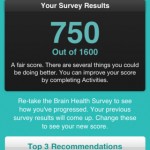 Do you have an iPhone or iPad and want to lower your risk of Alzheimer’s disease or other forms of dementia? Check out the the free BrainyApp. It let’s you apply the latest neuroscience to assess your risk and develop recommendations for keeping your brain and heart healthy.
Do you have an iPhone or iPad and want to lower your risk of Alzheimer’s disease or other forms of dementia? Check out the the free BrainyApp. It let’s you apply the latest neuroscience to assess your risk and develop recommendations for keeping your brain and heart healthy.
Not surprisingly the risk factors that the app uses are related to lifestyle and include diet, smoking, blood pressure, weight exercises and lack of mental activity. And the factors work together. For example, one study found that high salt diet combined with inactivity in older adults contributed to cognitive decline.
Interested to hear from readers that have used this app or similar apps to gain insight into how lifestyle choices impact brain health.
Categories: Cognitive Decline, Lifestyle, Older Adult, Software Tags:
Will Playing Video Games Boost Kid’s Creativity?
 The answer is yes according to recent research at Michigan State University. They studied 500 12-year-olds and found that playing video games increases creativity when it comes to drawing pictures and writing stories. The finding is robust:
The answer is yes according to recent research at Michigan State University. They studied 500 12-year-olds and found that playing video games increases creativity when it comes to drawing pictures and writing stories. The finding is robust:
“… regardless of gender, race or type of game played by the students, the study found a relation between video game playing and greater creativity.”
They also found no increase in creativity through the use of computers, the Internet or smart phones.
Interested to hear from readers that include video game playing in an effort to develop their children’s brain function and cognitive performance.
Categories: Child, Problem Solving, Software Tags: creativity, games
21st Century Problem Solving Skills for Students
 For more than 25 years Designation ImagiNation has delivered an after school experience that builds creativity, critical thinking and collaborative problem solving skills in k-12 and university level students in more than 30 countries. Students form small teams of 2-7 members, select an open-ended challenge, learn to generate and test creative solutions and then compete in tournaments. They reach over a 100,000 students a year and the tournaments are a significant event. Check out the 2011 global finals. I’ve included a photo (to the right) from the opening ceremonies in this post.
For more than 25 years Designation ImagiNation has delivered an after school experience that builds creativity, critical thinking and collaborative problem solving skills in k-12 and university level students in more than 30 countries. Students form small teams of 2-7 members, select an open-ended challenge, learn to generate and test creative solutions and then compete in tournaments. They reach over a 100,000 students a year and the tournaments are a significant event. Check out the 2011 global finals. I’ve included a photo (to the right) from the opening ceremonies in this post.
Some challenges include:
- Deliver a theatrical performance on the use of solar energy
- Create a movie trailer with characters from at least two nations
- Design and build a wooden and glue structure that can hold a heavy weigh
Here is the pitch:
“By participating in the team-based competitive program, children can achieve lifelong benefits, improve self confidence, and learn the creative problem solving process and develop critical thinking skills.”
There are plenty of opportunities to start a team, sponsor a team or volunteer.
Interested to hear from readers that have participated in the program. How are they teaching creativity and critical reasoning skills?
Categories: Child, Problem Solving Tags:
Cognitive Training uses Music to Boost Verbal IQ
Music is one of the best ways to charge up your cognitive performance in both the short and long term. What differentiates music from noise or other sounds? It is exactly its ability to authentically move our hearts and extend our minds. Music is brain boosting technology by definition. That’s why in the Next Brain blog we are always on the look out for applications that use music to improve brain function or enhance cognitive performance.
 For example, a new study by The Royal Conservatory of Music in Canada, York University and others showed that students 4-6 years old experience a measurable increase in IQ after just 20 days of music-based cognitive training. The improvement showed up in before and after testing and EEG brain imaging.
For example, a new study by The Royal Conservatory of Music in Canada, York University and others showed that students 4-6 years old experience a measurable increase in IQ after just 20 days of music-based cognitive training. The improvement showed up in before and after testing and EEG brain imaging.
The music-based cognitive training included interactive cartoons that delivered lessons twice each day for one hour. A picture of the cartoon is included in this post. To see more watch a video.
While only one study, the results are significant. An impressive 90% of the 48 students in the study show improvement in verbal intelligence after just 40 hours of training. There was a control group and the differences showed up in an EEG that measure functional brain activity. The effects should be long lasting. For more details check out the press release on the Association of Psychological Science web site.
Interested to hear from readers that use music-based training programs.
Categories: Child, Music and Audio, Software, Training Tags: art
More than 50% of Brain Health is up to You!
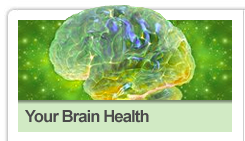 At least that is the conclusion from a review of the current state of research described on the Beautiful Minds website. The site is a educational effort by the National Center for Creative Aging and Martek Biosciences Corporation. They define brain health in terms of four dimensions:
At least that is the conclusion from a review of the current state of research described on the Beautiful Minds website. The site is a educational effort by the National Center for Creative Aging and Martek Biosciences Corporation. They define brain health in terms of four dimensions:
- The nourished mind
- The mentally engaged mind
- The socially connect mind
- The physically active mind
They have a quiz you can take to see where you stand and have even developed a brain health index for all 51 states.
As you can see Maryland is ranked #1 and Mississippi is ranked last. When you go to the site you can click on each state and get more details including an analysis of strengths and weaknesses.
All the tips they offer have been covered elsewhere on the Next Brain blog but it is useful to review them. The site also offers inspirational stories, a beautiful mind contest and resources for the healthcare professional. Check it out and let me know what is most useful.
Categories: Cognitive Decline, Diet, Lifestyle, Older Adult Tags:
Walnuts Boost Critical Thinking Skills By 11%
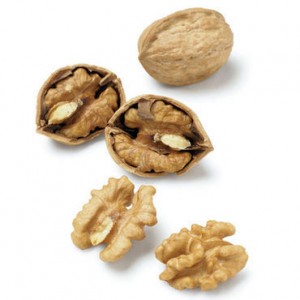 Researchers at Andrews University have found a potential connection between eating walnuts and improved critical reasoning skills in young adults. They published their findings in the British Journal of Nutrition. The bottom line:
Researchers at Andrews University have found a potential connection between eating walnuts and improved critical reasoning skills in young adults. They published their findings in the British Journal of Nutrition. The bottom line:
“Students consuming walnuts showed a significant improvement in inference after consuming one-half cup of walnuts daily for eight weeks,” says Pribis. “Walnuts will obviously not make you a critical thinker; this comes after years of studying. However, students and young professionals in fields that involve a great deal of critical thinking or decision-making could benefit from regularly eating walnuts.”
Significant improvement in this case means scoring 11% higher on a verbal inferential reasoning task. Walnuts were ground up and consumed by having two sliced of banana bread every day.
We have reported on additional claims that walnuts provide a cognitive boost elsewhere on the Next Brain blog
I am interested to hear from readers that use walnuts to improve brain function or cognitive performance. How many do you eat and how often? How do you consume them – raw or as an ingredient in some other food?
Categories: Cognitive Decline, College Student, Diet, Problem Solving Tags:

